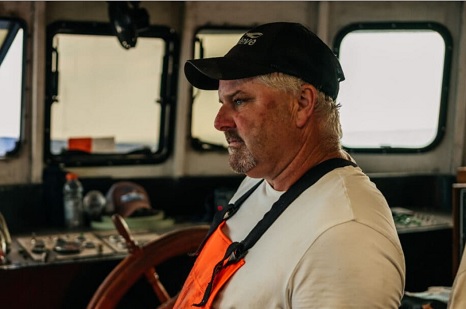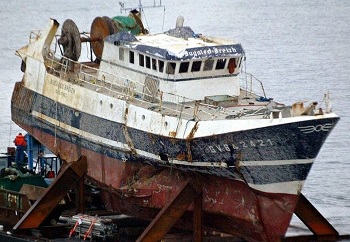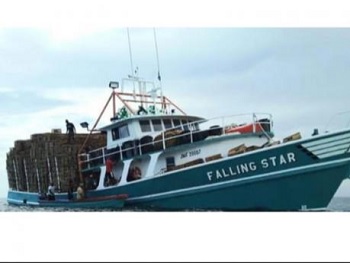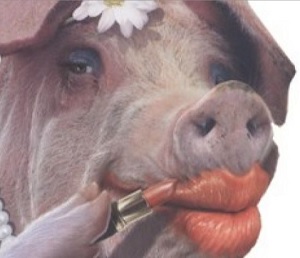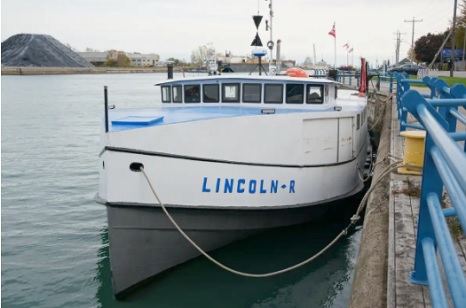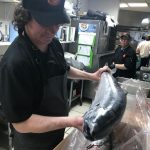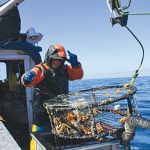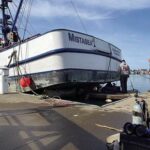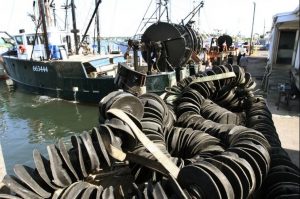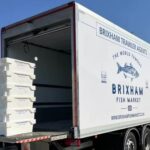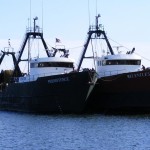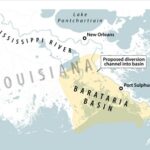A loose coalition of offshore wind opponents is forming from North Carolina to New England to the Great Lakes to question or challenge the expanding list of proposed projects. The Thomas Jefferson Institute for Public Policy has affiliated with the coalition, with our concerns over Dominion Energy Virginia’s proposed 5,280 megawatt project basically being economic. Massive worldwide economic forces are behind this push, most of them positioning the company to earn substantial profits from energy ratepayers. The Virginia State Corporation Commission, basically under orders from the General Assembly to approve the offshore wind proposed by Dominion, has estimated the all-in consumer cost of the Dominion project at more than $37 billion. It accounts for about a third of the $807 annual increase in residential electric bills the SCC has projected by 2030, with the power provided dependent on unreliable wind. >click to read< 11:55
Category Archives: Inland Fisheries
Captain hurt in Commercial Fishing Boat crash
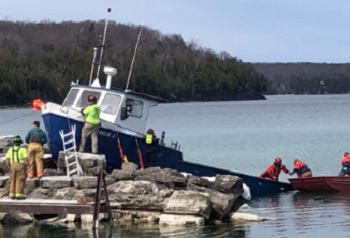 A commercial fishing vessel captain is hospitalized after a Friday morning boating accident in Gills Rock. Sister Bay/Liberty Grove Fire Department Chief Chris Hecht says the “Heather J” crashed into rocks on the shoreline around 10 am. Door County Emergency Services assisted firefighters in extracting the captain from the vessel, who was then taken to a Green Bay hospital. To be updated. >click to read< 10:19
A commercial fishing vessel captain is hospitalized after a Friday morning boating accident in Gills Rock. Sister Bay/Liberty Grove Fire Department Chief Chris Hecht says the “Heather J” crashed into rocks on the shoreline around 10 am. Door County Emergency Services assisted firefighters in extracting the captain from the vessel, who was then taken to a Green Bay hospital. To be updated. >click to read< 10:19
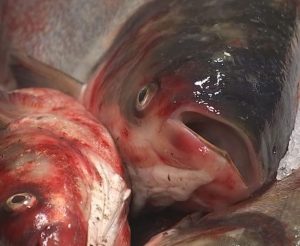
Ribbon Cut on Aurora Facility for Asian Carp Processing
New England faces a 70 million pound lobster bait shortage this year and the bait problem isn’t going away – neither are the invasive Asian Carp on Kentucky and Barkley Lakes. Brian Colgan founded Colgan Carp Solutions to provide a private sector answer to the Asian Carp problem. Their business models Asian Carp into a sought-after commodity with opportunities for entry into various markets. From bait to fertilizer, pet food and human consumption…there are numerous entry points for Asian Carp. To start, Colgan is turning Asian Carp into Lobster Bait. >click to read< 09:31
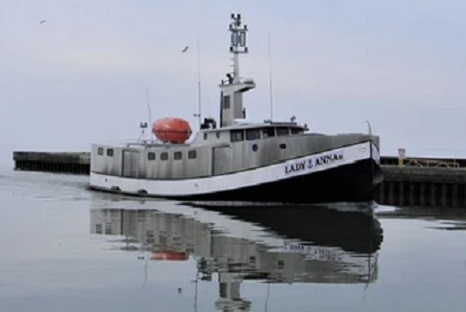
Commercial fishing out of Wheatley Harbour is like ‘farming on the water’
On a foggy March 9, I followed the 15-mile-long County Rd. 1, the Wheatley Road, due south from Tilbury. Except for two bends, that skinny ribbon of two-lane asphalt shoots arrow-straight and pancake-flat across the see-forever farmlands connecting Tilbury to Lake Erie’s north shore and to Wheatley, the world’s largest commercial, freshwater fishing port. So it was with Lady Anna II. I heard the low purr of a slow-turning diesel engine before I saw her. When I first spotted her, she looked like a small, grey box suspended over Lake Erie. And, before I knew it, her bow slicing the glassy-smooth water at a cruising speed of nine knots, Lady Anna II was at the mouth of Wheatley Harbour. >click to read< 22:00
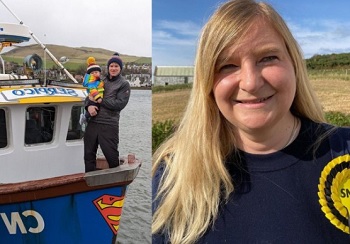
‘Never-ending battle’ for creel fisherman as Jenni Minto MSP seeks support after ban
A creel fisherman based at the Clyde continues to feel ignored and neglected as an MSP has asked the Scottish Government to consider “all options” to support families affected by a ban. Jenni Minto, SNP MSP for Argyll and Bute, has written to the Scottish Government to ask for support to be considered for fishermen impacted by a closure in the Clyde. Despite the MSP’s action, creel fisherman Paul McAllister said he continues to feel “purposefully ignored” by the Scottish Government and “weighed down”. Last week, the Scottish Government said the ban would have “short-term costs” to protect the cod population. >click to read< 08:27
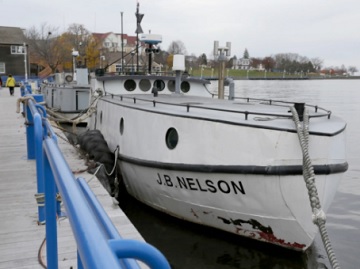
Sheboygan history: Fishing boats from yesterday and today in photo’s
The J.B. Nelson is docked at the Sheboygan riverfront, Saturday, November 20, 2021, in Sheboygan, Wis. According to Harvey Hadland’s online history of fishing vessels of the Great Lakes, the J.B. Nelson was built by Burger Boat Co. in 1937 for Leonard A. Nelson, Sturgeon Bay, Wis. The 40 ft. x 11 ft. all steel vessel was equipped with a 45-54 hp. Kahlenberg oil engine. In 1981 ownership went to another Nelson, Mark Nelson, in Sheboygan, Wis. The boat’s power plant has been replaced with a Cummins diesel. 12 photos, >click to read< 16:13

Opposition Forms from N.C. to N.E. to Great Lakes over ocean industrial development all-in consumer cost
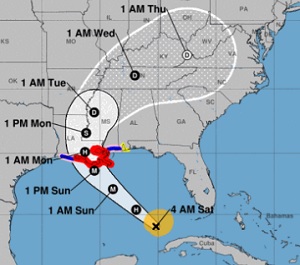
Hurricane Ida: Moving north into the Gulf, expected to strengthen to Cat 4
Ida, currently a Category 1 hurricane, is expected to make landfall late Sunday or early Monday. Sunday is the 16th anniversary of Hurricane Katrina. Watches and warnings are in effect for Louisiana, Mississippi and Alabama. Saturday could be rainy in south Louisiana, making storm prep and evacuations more complicated, forecasters said. The rain is not from Hurricane Ida but from another disturbance moving over the state. Lots of details, >click to read<, to be updated. Life-threatening winds, storm surge, flooding and tornadoes from Hurricane Ida are expected Sunday. 11:04
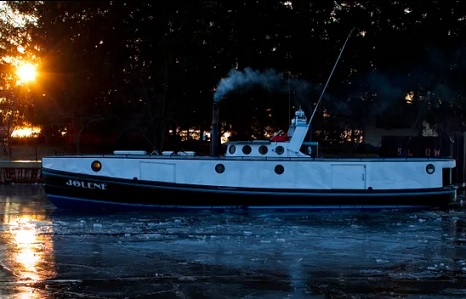
The last in a long line of Milwaukee commercial fishermen sets course for Alaska
The men have always started their day wondering whether a load of fish is straining the nets that they set the day before. Today their compass doesn’t point them toward any nets at all. The boat’s rumbling 855 Cummins diesel pushes them down the muddy Kinnickinnic River and under the Hoan Bridge. This is the moment when their eyes normally train on the open waters ahead. But today, the 52-year-old man notices his dad, Alvin, is glancing back. I think this is probably going to be the last time I see Milwaukee from the water, 77-year-old Alvin Anderson says. Yeah, his son, Dan, replies glumly. Then Milwaukee’s last working commercial fishing tug – the Alicia Rae – glides through the north gap of the Milwaukee Harbor breakwater. And it is gone. 20 photo’s, >click to read< 08:10
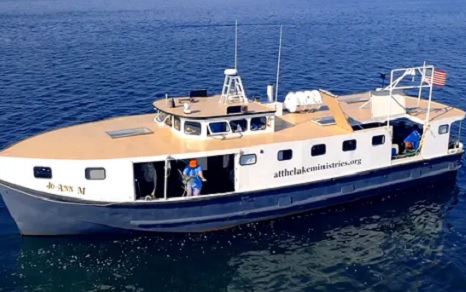
Converted Great Lakes Fishing Tug makes fishing possible for the disabled
A specially designed boat is connecting those with physical challenges to the joys of fishing on the water. “It’s amazing. I can’t believe it took so long for someone to come up with this idea,” Sean Ferry of Erie said about At The Lake Ministries in Erie. The nonprofit group converted a former commercial ship into a fishing boat that accommodates wheelchairs.,, Now they have a large ship that can handle groups of people who are facing similar challenges and spend a day outdoors.,, Volunteers, including some who are trained welders, electricians and painters, worked to convert the 53-foot ship into a passenger watercraft. It was built in 1980 and was the last commercial fishing vessel built by Paasch Marine Services (200th hull). The ship was formerly owned by the Munch family of commercial anglers and they named it the Jo-Ann M in honor of the family’s matriarch. Wilson said it’s only fitting the name stays with the ship. Video, photos, >click to read< 08:08
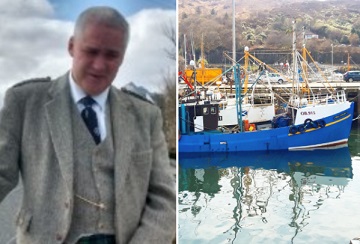
Tributes paid to Scot fisherman Lachlan Robertson, who died after falling overboard.
Lachlan Robertson, 61, passed away in the tragic incident after being pulled from the water in the Sound of Rum, near the Isle of Skye. The fisherman, and another man working on the boat, was recovered from the water by a third crew member. But Lachlan, also known as Lachie, was pronounced dead at the scene. Now heartbreaking tributes have been posted on social media following the tragic news. >click to read< 10:07
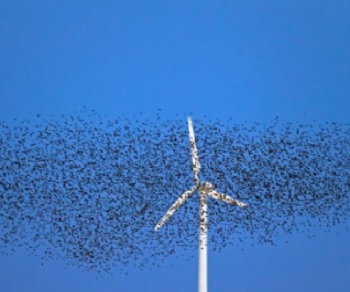
The bird people are willing to let them die for Offshore Wind Farms. The responsible wind farms, that is!
There is no shame when it comes to ignorance! “Renewable energy sources, including wind power, are essential to saving the lives of countless birds, in addition to saving our coasts.” – As the country takes stock of the first months of the Biden Administration, the waters of New England are playing host to the epicenter of one of the major climate commitments made shortly after the president took office. The largest U.S. offshore wind project to date, Vineyard Wind, has received the green light to start building off the coast of Massachusetts, promising to deliver 800 megawatts of energy to over 800,000 homes. As conservation organizations that are committed to the protection of birds and the ecosystems,,, >click to read< 08:42

We’re losing fishing grounds – Trump says Vineyard ‘will never be the same’ after Vineyard Wind Farm
Will Vineyard Wind, the nation’s first permitted commercial-scale wind farm, change island life in Massachusetts forever? Former President Donald Trump thinks so. On the day that the massive wind farm planned off the coast of Martha’s Vineyard and Nantucket won the federal approval from the Biden administration that it had been fruitlessly seeking from Trump for years, the former president weighed in with a touch of sarcasm. The project, however, still has opponents, including the commercial fishing industry and some environmentalists worried about how the farm will impact the migratory patterns of rights whales and other marine life. >click to read< 10:01
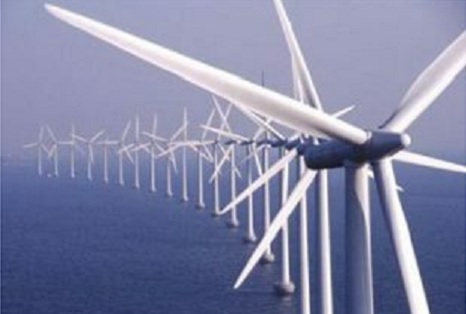
Does Biden have an ocean policy? – Climate change and ocean industrialization!
Days after taking office the president signed an executive order to fully conserve 30 percent of the nation’s land and 30 percent of its waters by 2030. One of the world’s strongest supporters of 30×30 is special presidential Climate Envoy John Kerry. Biden also pledged the U.S. will generate 30 gigawatts of offshore wind by 2030.,,, To keep its quickly-evolving ocean strategy salty, the White House has put some top marine people in charge. They’ve brought in Jane Lubchenco, Climate Czar Gina McCathy, nominated NOAA Chief Scientist Rick Spinrad to lead NOAA, and Monica Medina as assistant secretary of State for Oceans, Environment and Science. >click to read< 10:49
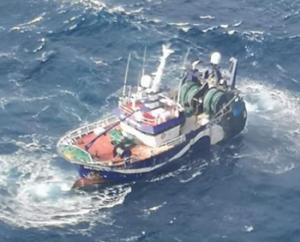
Lack of papers for fishermen rescued off Cork coast under investigation
Three separate investigations are under way into how two fishermen, who were dramatically rescued from a fishing vessel last month, had no permits to work on board. Mohamed Elbahlawan (40) and Elhag Abdrabo (32), both Egyptian, were among seven crew airlifted from the on March 27th, off the Cork coast as it battled “horrendous” sea conditions and 7m (22ft) waves over two days. The fact that they had no work permits – which the boat owner, R&E Fish Ltd, should have applied for – means they have no access to social welfare supports. They are stranded, unable to work and unable to afford to go home. >click to read< 09:18
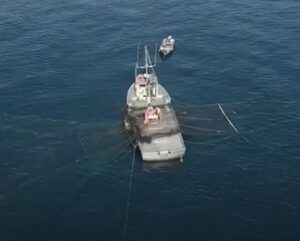
Inland Fisheries: A big fight in Lansing over fishing rules on the Great Lakes
Dana Serafin still hauls in 20,000-pound boatloads of whitefish to supply regional restaurants and markets, Native whitefish, the main livelihood for Serafin and other Great Lakes commercial fishermen, have been in decline for years amid changes to the food web, replaced in Serafin’s nets by healthier populations of walleye and lake trout that he’s not allowed to keep. Chinook salmon, once a favorite of recreational anglers on lakes Michigan and Huron, have also plummeted in Lake Michigan, and all but disappeared from Lake Huron. Battles are brewing over fishing rights from recreational, commercial, Native American, and environmental group meddling. Video, >click to read< 13:41
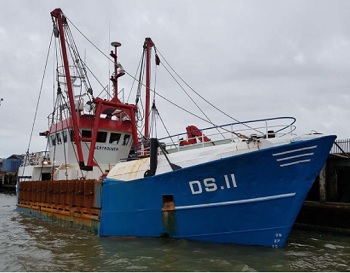
Skipper David Marr found guilty of not keeping lookout
The captain of a trawler which swamped a small boat causing it to sink, and three men to drown, has been found guilty of not keeping a proper lookout. Mircea “Mitch” Ilie, 40, Irinel Popovici, 41, and Treaiam Dumitrache, 50, died on an overnight fishing trip on the James 2 in August 2017. Marr, 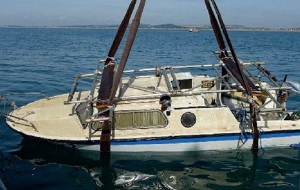 55, of Peterhead, will be sentenced later. He was found guilty at a Lewes Crown Court trial, which was sitting at Brighton Magistrate’s Court. >click to read< David Marr did not see men in fishing boat – Their fiberglass boat was designed for inland waters only and did not have adequate lights or Radar reflectors. >click to read< 10:42
55, of Peterhead, will be sentenced later. He was found guilty at a Lewes Crown Court trial, which was sitting at Brighton Magistrate’s Court. >click to read< David Marr did not see men in fishing boat – Their fiberglass boat was designed for inland waters only and did not have adequate lights or Radar reflectors. >click to read< 10:42
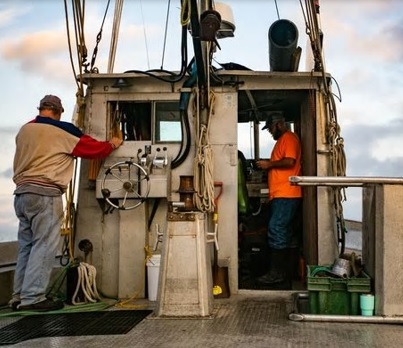
Big news for a major Michigan industry: commercial fishing.
Changes to the rulebook in January had fisheries warning the fresh catch may soon come from Canada. The DNR is now walking back those rules, requiring fishermen to cast their nets in water under 80 feet and suspending part of the whitefish season,,, “Everyone’s ecstatic.” A reversal from the DNR, effectively lifting the depth and seasonal restrictions the Williams’ and other commercial fisheries argue had upended their ability to make a living, means it’s now back to business as usual. >click to read< 07:42
Michigan House Bills Ban Commercial Perch Fishing on Great Lakes – Lakon Williams of the Bay Port Fish Co. expressed her concern. The company nets whitefish and perch in Saginaw Bay and Lake Huron. >click to read<
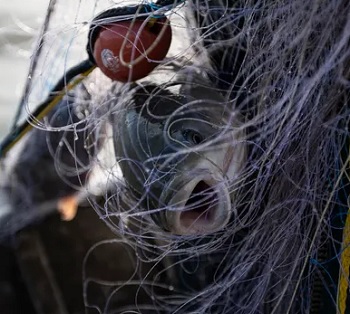
“The Perfect Catch” campaign: Asian carp is getting a new name and a public makeover
Illinois officials and their partners want to give the invasive Asian carp threatening the Great Lakes a similar makeover. The goal: To grow the fish’s image as a healthy, delicious, organic, sustainable food source which will in turn, get more fishermen removing more tons of the fish from Illinois rivers just outside of Lake Michigan. Markets such as pet food, bait and fertilizer have expanded the use of invasive Asian carp in recent years. But “it’s been hard to get the human consumption part of this because of the four-letter word: carp,” A full-on media blitz is coming later this year to change that. >click to read< 09:51

Lake Michigan Commercial Fisherman Robert E. Strege has passed away
Robert E. Strege, age 90, passed away on January 1, 2021. He was born on November 8, 1930 to parents Richard and Amelia (nee. Schultz) Strege in Jacksonport, WI. Robert proudly served in the United States Army during the Korean War, and for his honorable service, was awarded the Purple Heart. Following his military service, Robert owned and operated his own commercial fishing company, called Robert Strege Fish Co., for many years. He caught chubs, perch, and whitefish, on his boat, >“The Palmer”<, on Lake Michigan. Robert will be remembered, as a loving, hardworking man that took care of his family and will be dearly missed. >click to read< 14:47
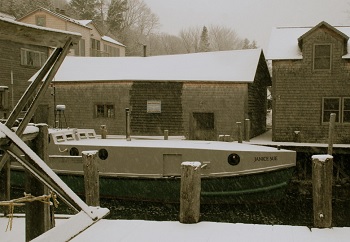
New restrictions on commercial fishing amount to ‘extortion’
In a scathing letter, several Michigan legislators urged the state Department of Natural Resources to renew all commercial fishing licenses and permits from 2020. That’s after the DNR announced new restrictions that close the fishery for part of the year and limit the depth where fishers can catch whitefish to 80 feet. “The whole industry is out of business at that 80 feet,” Dennis VanLandschoot, of VanLandschoot & Sons Fish Market in Munising,,, These changes would not affect tribal fishers, whose fishing rights are guaranteed under federal treaty. >click to read< 14:25
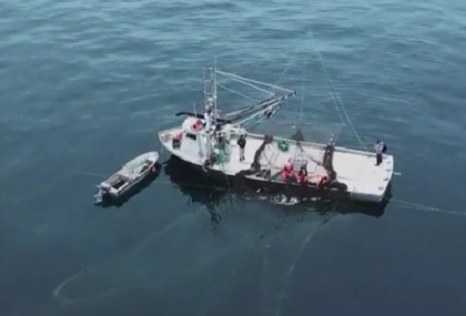
Federal Relief: Great Lakes fisheries finally get a cut of Coronavirus relief funds
After being snubbed in 2020, the folks who make their living by fishing the Great Lakes – both commercially and for sport – have been included in the latest round of federal relief from the economic ravages of COVID-19.,, Neither group was included in the massive Coronavirus Aid, Relief, and Economic Security Act that passed in March 2020, even though $300 million was specifically earmarked for U.S. fisheries.,, Getting the Great Lakes included in CRRSA was just the beginning. Now comes the harder work of figuring out how to access the money. Video, >click to read< 16:10
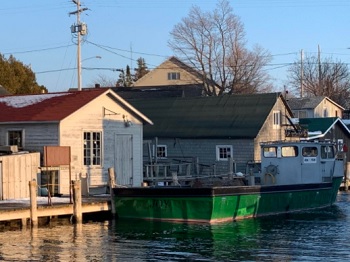
Gloves Come Off In Fight Over Commercial Fishing In Michigan
The few commercial fishing businesses that remain in Michigan are suing the state’s Department of Natural Resources over changes to industry rules. They say the new provisions will make commercial fishing all but impossible. The lawsuit, filed by the Michigan Fish Producers Association, claims the actions of the state threaten to deprive its members and their employees of their livelihoods. “Here in Leland, you can’t fish,” says Joel Petersen, the last state-licensed fishermen working out of Fishtown. >click to read< 09:35
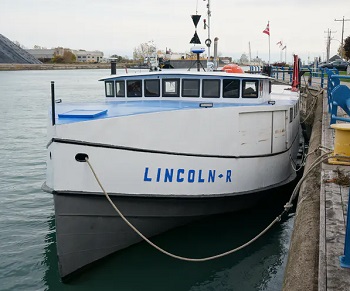
Family owned working waterfront fishing businesses displaced by waterfront developments on Great Lakes
For three generations, the Minor family, today brothers Carson and Landon and their father Paul, have been up before first light to board their fishing tug and make their way to their fishing grounds on Lake Erie. Most mornings, the Minors leave from Port Colborne, Ont., Each afternoon they return to the port to unload their fresh catch of perch and pickerel.,, Without warning, the unloading zone their family had used for more than 70 years was blocked off. They were forced to move to a new port further away from their fishing grounds, increasing travel time and putting them at greater risk during bad weather.,, The Minors’ story is not new, nor is it isolated. Working waterfront access is being affected by coastal gentrification, also called “coastal grabbing” >click to read< 16:47

Inland Fish Fight: Invasive Asian carp threaten Kansas and Missouri waterways
Common carp, which resemble overgrown goldfish, were imported from Europe, where they were popular sportfish and table fare over 150 years ago. But bighead and silver carp were first brought from Asia about 50 years ago, Chapman said. Being plankton eaters, the carp were imported with the hope they could clean waters of unwanted materials, including sewage lagoons. It didn’t work out that way. “There’s never been a fish brought in for large-scale aquaculture that hasn’t escaped into the wild,” Chapman said. “Somebody wasn’t paying attention.” >click to read< 10:47
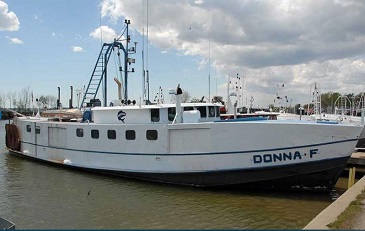
‘15 minutes out mama’: The tragic story of Port Dover fisherman Michael Smith who drowned in Lake Erie
Frigid water shushing against the hull, spray peppering windows, as the fish tug bores through Lake Erie, clouds breaking to reveal the pale, fleeting blue of a mercurial March sky. On board, Michael Smith sent his wife a text like he always did to start the day: “Good morning beautiful, I love you.” They headed southwest around Long Point, the 40-kilometre sand spit that stretches nearly halfway across the lake. Smith recorded video: the wheelhouse, engine rumbling, tote boxes awaiting some of the first smelt of the commercial fishing season. He pulled open a steel door through which the trawling net is pulled, to show the water rolling by. He made it a ritual to kiss the net before releasing it to the lake. >click to read< 10:41






